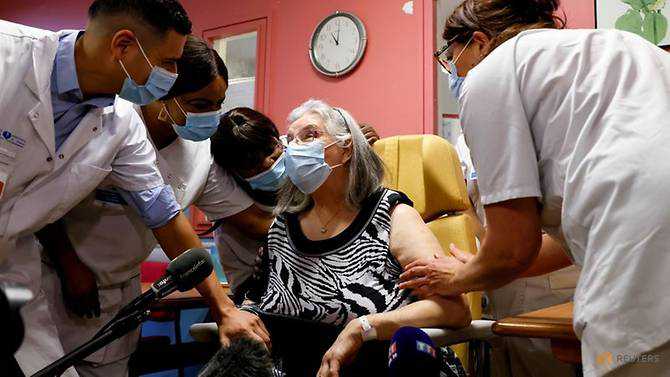EU's marathon COVID-19 vaccination get off to uneven start
30 December, 2020

The European Union's campaign to vaccinate Europeans against COVID-19 offers off to an uneven begin in what will be a marathon effort to administer shots to enough of the bloc's 450 million persons to defeat the viral pandemic.
In a single mishap, eight personnel at a care residence in Stralsund on the north German coast were injected with five circumstances the recommended dose of the vaccine developed by Pfizer and BioNTech. Four were hospitalised.
"I deeply regret the incident. They case is because of individual errors. I hope that those affected do not experience any serious unwanted effects," district chief Stefan Kerth explained on Monday.
In southern Germany, officials had to send back about 1,000 doses after finding that they had been transported in cool boxes typically used for picnics or camping trips that didn't keep the vaccine cold enough.
The EU vaccination get kicked off at the weekend, with health personnel and residents of care homes over the bloc among the first to obtain the shots from Pfizer, which should be placed at ultra-cold temperatures.
In Italy, meanwhile, some politicians complained that Germany - the EU's major member state and home to BioNTech - may be getting ultimately more than its fair share of shots.
The EU is because of receive its first 12.5 million doses of the Pfizer vaccine by New Year's Day, with distribution of 200 million doses across its 27 member countries to be completed by next September. The vaccine course requires two doses.
A spokesman for Pfizer declined to comment on specific schedules or if the timeline indicated by the Commission represented a delay. "Our timelines are aspirational and will shift predicated on capacity and manufacturing timelines," he said.
Talks are under way to agree on the delivery of a great optional further 100 million doses under the contract sealed with the two companies, the EU said.
KEEPING COOL
The original glitches highlight the task in rolling out the vaccine while regulators consider approving other vaccines, including from Moderna and AstraZeneca, which are much easier to transport and store.
The rollout of the Pfizer shot in the usa has been slow, putting the government's target of 20 million vaccinations this month in doubt, as hospitals navigate preparing the previously frozen shots for use, finding staff to perform clinics and ensuring proper social distancing.
And also being the first COVID-19 vaccine to be delivered over the EU, the Pfizer shot is specially tricky to handle. For long-term storage it needs to end up being deep frozen at about minus 70 degrees Celsius.
It is usually defrosted for a few days before being used, but even then must be kept chilled at between 2 degrees Celsius and 8 degrees Celsius.
In southern Germany, officials said they might not use most shots after temperature trackers in cool boxes showed they might not exactly have been kept cold enough.
"There were doubts as to whether the freezing chain was maintained constantly," said Christian Meissner, district administrator found in the Bavarian village of Lichtenfels.
"BioNTech said that the vaccine was probably okay, but 'probably okay' isn't enough," he told Reuters Tv set.
The lapse happened after the doses were handed over to the neighborhood authorities. BioNTech declined to comment.
Found in Spain, delivery of a fresh batch from Pfizer was held up by a day to Tuesday because of a temperature issue that has now been resolved, Well being Minister Salvador Illa said.
Maria Asuncion Ojeda, a resident at Madrid's Ballesol Parque Almansa nursing home, was even now delighted to come to be an early on recipient of the Pfizer vaccine.
"I wanted to accomplish it because it is the only way we are able to solve this issue," the 87-year-ancient said on Monday, a good day after Spain commenced vaccinating care-home citizens and their staff.
FAIR SHARES
The EU is distributing jointly procured vaccines on a pro-rata basis to the 27 member states predicated on their populations, although some European countries also have made their own deals to get extra doses separately.
In Italy, plenty of politicians said Germany were getting more than its fair share, at least through the highly symbolic initial rollout.
"The accounts don't add up," Italian virologist Roberto Burioni explained over Twitter, pointing to studies in Germany that first-day deliveries had totalled a lot more than 150,000 dosages while additional EU countries got merely 10,000.
An official acquainted with vaccine distribution in Germany said that each one of the 16 German federal claims had received 10,000 doses of the Pfizer vaccine ahead of the weekend start of inoculation drive.
An Italian reporter asked about the supplies at a German federal government news conference. The official from the German health ministry replied that Berlin experienced signed a separate deal for 30 million extra doses of the Pfizer vaccine.
Source: www.channelnewsasia.com
